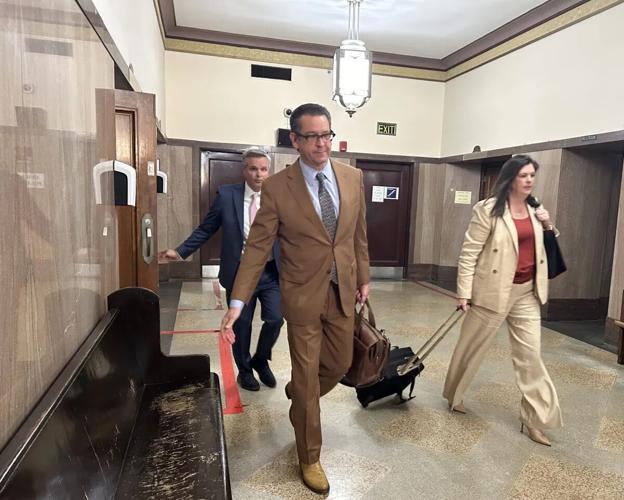Day One — Monday, March 25, 2024
A former school board president and an Oklahoma State Bureau of Investigation agent testified on the opening day of a week-long court hearing in the criminal case against the founders of Epic Charter Schools.
The state’s attorneys will attempt to convince Oklahoma County District Special Judge Jason Glidewell there is enough evidence to bind the defendants over for trial.
David Chaney, 44, and Ben Harris, 48, each face 15 charges related to their operation of the online charter school, including embezzlement, money laundering, computer crimes and conspiracy to defraud the state. They have denied wrongdoing.
Chaney, wearing a gray jacket and glasses, appeared with his attorney, Gary Wood. Harris, in a blue suit and pink tie, attended with his attorneys, Joe and Kate White.
Much of OSBI agent Mark Drummond’s testimony, the first witness, focused on multiple companies involved in Epic and their bank records. Prosecutors allege Chaney and Harris used shell companies to conceal millions in illegal profits. Drummond has been the lead investigator on the case since 2020.
One bank account belonging to Epic Youth Services, Chaney and Harris’ for-profit company, collected money from the school through a 10% management fee. The company made payments mainly to five entities: Chaney, Harris, a technology company owned by Harris’ wife, chief financial officer Josh Brock through his consulting firm, and lobbyist Bobby Stem.
Thousands of pages of bank records from multiple accounts were submitted as evidence but won’t be available in the court file. The judge agreed to admit the records under a protective order.
Doug Scott, former chairman of Epic Charter Schools’ board, took the stand in the afternoon. Scott, an attorney in Tulsa, has known Chaney since they were children.
Prosecutors questioned Scott about the learning fund, a unique feature that allowed parents to select some educational items. Each year, the school directed a set amount per student to the learning fund, managed by Epic Youth Services.
Some of the embezzlement charges accuse Chaney and Harris of diverting money in the learning fund to themselves as profit or to other charter schools they managed.
Prosecutors argued that Epic Youth Services was responsible for managing the learning fund money on behalf of Oklahoma students and weren’t authorized to spend it however they wanted. Attorneys for Chaney and Harris argued that the money was no longer public funds once paid to Epic Youth Services.
The hearing will resume Tuesday at 9 a.m. Epic’s former chief financial officer, Josh Brock, is expected to be called to testify. He faces the same charges but waived his right to a preliminary hearing.
Day Two — Tuesday, March 26, 2024
Day two of a preliminary hearing for Epic Charter Schools’ co-founders concluded in the midst of testimony from Jeanise Wynn, the school’s deputy superintendent of finance since 2021. That year, the online charter school was managing fallout from a critical state audit and a contract termination that threatened to close the school.
Wynn considered it a challenge to right the school’s finances and accepted the job offer, she said in court Tuesday. Right away, some financial practices concerned her. One was the student count Epic used to pay Epic Youth Services for the learning fund, which was higher than the average enrollment. “There was a distinct difference between those two numbers,” Wynn said. “About $8 million if I remember.”
Legal wrangling over whether Wynn could describe comments Harris made in an executive session of a meeting of the school’s board ate nearly an hour of the day. Defense attorneys objected, arguing the conversation was privileged and confidential.
Ultimately, Judge Glidewell allowed Wynn to answer a question about what was said in the meeting, which took place in 2021.
Harris, Wynn said, informed the board and others in the closed session that Epic Charter Schools had paid money to the Epic charter school in California. Harris’ comment was meant as a heads-up to the board because the information would soon be released in a report.
Throughout the day’s testimony, prosecutors hammered several learning fund policies — that religious curriculum could not be purchased and that parents could not keep items because they belonged to the school — to support the argument that the money being spent was public. Defense attorneys have argued the dollars became private once paid to Epic Youth Services.
Chandler Winningham, who was hired by Epic in 2018 as director of the student learning fund, also testified.
Both Winningham and Wynn described how Epic employees processed learning fund orders for students at Epic California, despite being employees of Oklahoma. Some of the embezzlement charges accuse Chaney and Harris of diverting money in the learning fund to themselves as profit or to other charter schools they managed.
Renee McWaters, program manager for the state Education Department’s state aid section, also testified Tuesday, describing different funding allocations schools receive and statutory limitations on some of those dollars, such as for textbooks.
The hearing continues at 9 a.m. Wednesday.
Day Three — Wednesday, March 27, 2024
Nearly all the testimony on the third day of a hearing in the embezzlement case against Epic Charter Schools’ co-founders came from Salesha Wilken, an auditor in the Oklahoma State Auditor & Inspector’s office.
The auditor’s office hired Wilken in 2015 and she was one of the three main auditors who worked on the Epic Charter Schools investigative audit released in October 2020. Findings from the audit form the backbone of the state’s criminal case against Epic co-founders David Chaney and Ben Harris and their longtime chief financial officer, Josh Brock.
Wilken described auditors’ struggle to obtain financial records from Epic Youth Services, Chaney and Harris’s educational management company, in the early stages of the audit. Eventually, bank records were obtained with assistance from the Oklahoma State Bureau of Investigation, Wilken said.
Those records revealed numerous large and frequent transfers from a bank account the company maintained for the learning fund to the company’s general operating account, Wilken testified. There were 52 such transfers totaling $3.2 million. That concerned her.
“These were public monies,” Wilken said. “These were for the kids.”
When the school cut ties with Epic Youth Services in 2021, in the wake of the audit, the account’s balance was about $5 million, she said. Chaney and Harris subsequently invested nearly all of that money in securities.
In February, Chaney and Harris agreed in a court order to leave that money untouched during the criminal proceedings. The attorney general’s office wants the money forfeited if they secure a conviction.
On cross-examination, Joe White, who represents Harris, interrogated Wilken for more than 2 1/2 hours. Many times, White attempted to get Wilken to describe the money in Epic Youth Services’ learning fund account as private dollars.
“Can you and I agree the law on what constitutes private funds is gray?” White asked.
“I can’t offer an opinion on that,” Wilken said.
Wilken’s testimony wrapped up just before 5 p.m. The hearing continues at 9 a.m. Thursday.















Commented
Sorry, there are no recent results for popular commented articles.